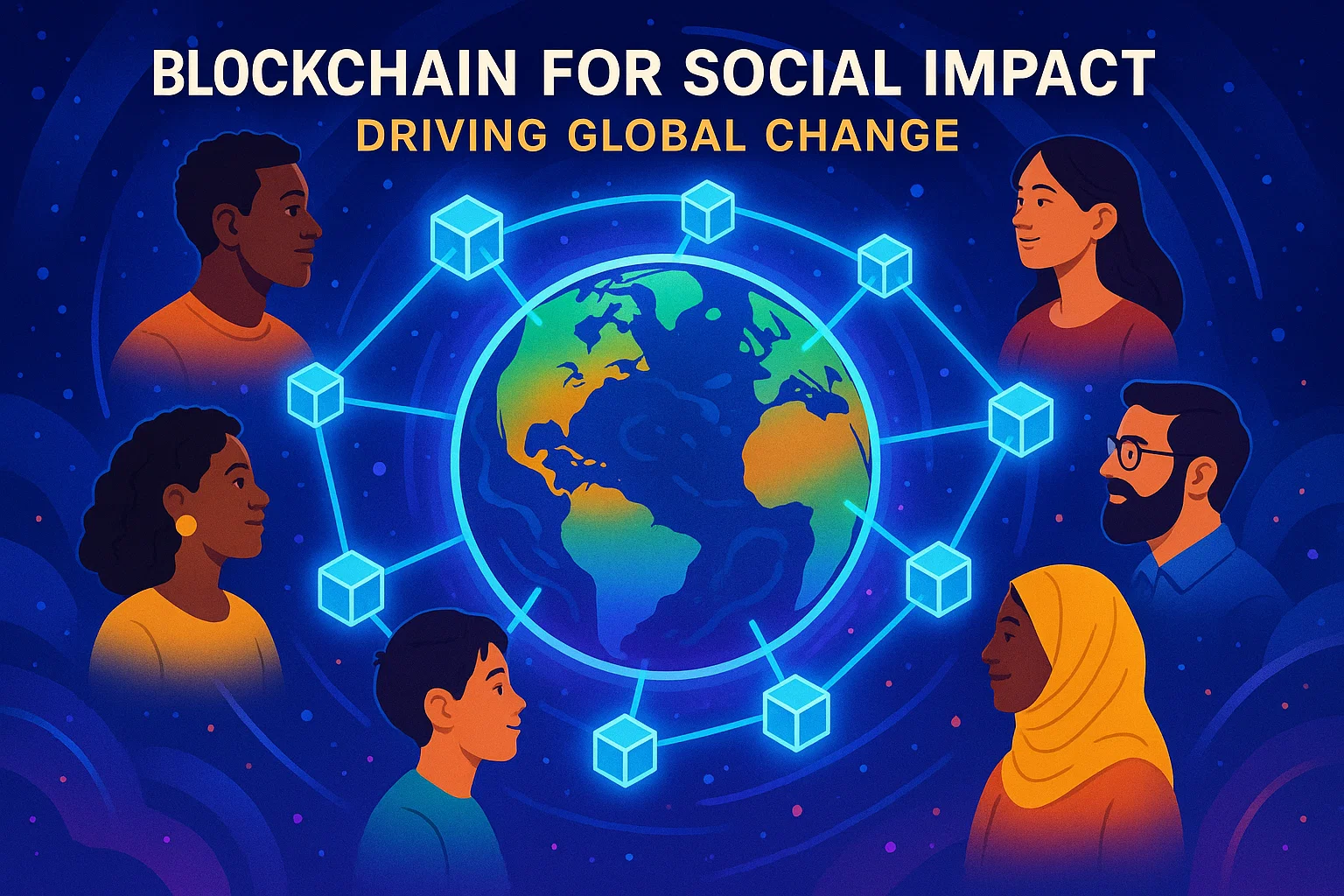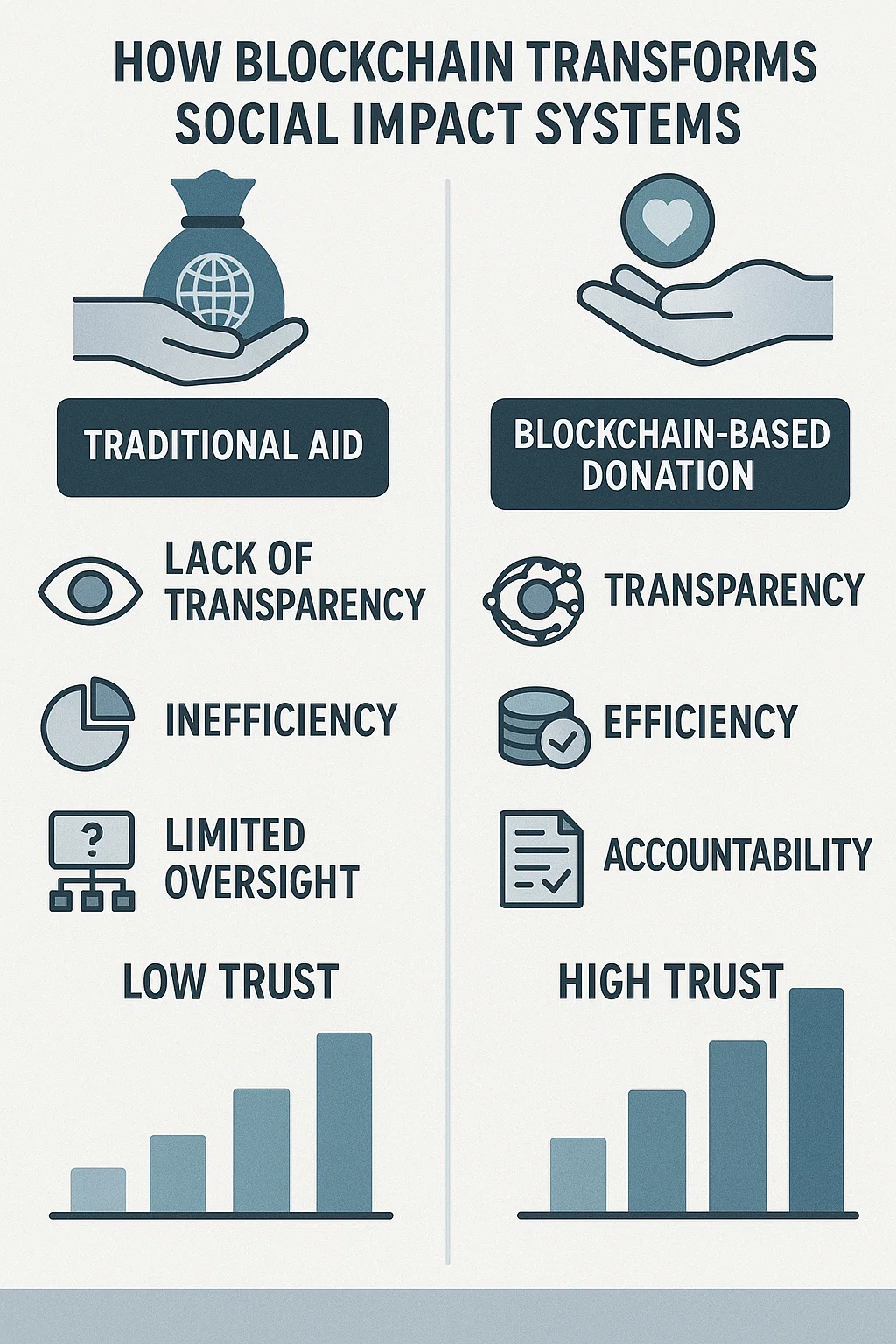
Why Blockchain Matters for Global Good
For years, blockchain was seen as the tech behind Bitcoin complex, volatile, and out of reach for everyday people. But that story is changing fast. Across the world, organizations are using blockchain to fight corruption, deliver humanitarian aid, and build transparent supply chains. It’s not just about crypto anymore. It’s about trust, accountability, and inclusion.
According to the World Economic Forum (2024), nearly 90% of major NGOs and global enterprises are exploring blockchain-based solutions to enhance transparency and efficiency. From food aid in refugee camps to verifying vaccine origins, blockchain is quietly reshaping the backbone of social impact.
In simple terms, blockchain is a digital ledger a record that everyone can see but no one can secretly change. That single principle is what makes it a tool for global good.
The Social Impact of Blockchain Technology
Let’s start with what blockchain really does: it replaces “trust me” with “see for yourself.” Every transaction or event recorded on a blockchain is verified, timestamped, and stored in a chain of encrypted blocks. That makes it nearly impossible to falsify or manipulate data.
Now, think about how many global problems come from a lack of trust corruption in aid distribution, counterfeit medicines, fake certificates, and unclear carbon tracking. Blockchain directly tackles these weaknesses.
Here’s a breakdown:
| Problem | Cause | Blockchain Solution | Impact |
|---|---|---|---|
| Corruption in aid funding | Manual reporting, lack of tracking | Immutable public ledger | Transparent flow of funds |
| Counterfeit goods | Weak verification systems | Smart contracts & digital IDs | Authentic product sourcing |
| Financial exclusion | No bank accounts or credit | Crypto wallets, DeFi apps | Direct global access to finance |
| Climate accountability | Poor emission tracking | Tokenized carbon credits | Verified sustainability metrics |
These aren’t futuristic promises they’re real solutions already in motion.
How Blockchain Is Changing the World
In 2025, blockchain is quietly embedded in some of the most impactful social programs worldwide.
1. Food Aid Distribution World Food Programme (WFP):
In Jordan’s Azraq refugee camp, the WFP’s Building Blocks project uses blockchain to distribute food vouchers. Families receive funds directly via digital wallets, verified by iris scans no banks, no middlemen. The program has saved over $40 million in transaction fees and cut fraud by nearly 98% since launch.
2. Agriculture and Fair Trade:
Farmers in Ghana and Kenya use blockchain-based mobile payments to verify crop sales and receive fair prices. Platforms like AgUnity log every trade, creating trust between farmers, buyers, and cooperatives.
3. Healthcare Transparency:
MediLedger, a consortium in the U.S., uses blockchain to authenticate pharmaceuticals. This prevents counterfeit drugs from entering the supply chain a critical issue that kills thousands globally each year.
4. Education Credentials:
Blockchain verification is replacing paper diplomas. UNESCO-backed initiatives use distributed ledgers to store academic records, helping refugees and migrants prove qualifications wherever they go.
Together, these examples show one thing: blockchain isn’t just a technology. It’s a trust infrastructure for a connected world.
Moving Beyond the Hype
Let’s be honest: blockchain has had its fair share of overpromising. Remember the 2018 wave of startups that added “blockchain” to their name to attract investors? That hype is long gone replaced by results.
The Blockchain for Social Impact Coalition (BSIC), launched by ConsenSys, now supports dozens of verified social ventures. From clean energy tracking to gender equality funds, BSIC’s mission is to move blockchain from buzzword to backbone.
Still, challenges remain:
- Scalability: Public blockchains struggle to handle millions of daily transactions.
- Regulation: Countries are still crafting laws around blockchain’s use in public systems.
- Energy Use: Although proof-of-stake systems cut emissions by 99%, sustainability remains a key concern.
The goal now isn’t to prove blockchain can help society it’s to make sure it does so responsibly.
The Four Types of Blockchain and Their Roles
Every blockchain isn’t built the same. To understand how different systems support social good, here’s a clear look:
| Type | Control | Speed | Transparency | Common Uses |
|---|---|---|---|---|
| Public | Open to all (e.g., Bitcoin, Ethereum) | Slower | High | Decentralized finance, open ledgers |
| Private | Controlled by one entity | Fast | Low–Medium | Supply chains, internal record-keeping |
| Consortium | Shared by a group | Moderate | Medium–High | Healthcare, logistics, banking |
| Hybrid | Mix of public + private | Variable | Configurable | Government and corporate collaborations |
For example, IBM Food Trust used by Walmart and Nestlé operates on a consortium blockchain, ensuring verified food sourcing without revealing trade secrets.
Blockchain’s Effect on Society and the Global Economy
The ripple effects of blockchain go far beyond humanitarian work. Economically, it’s becoming a foundation for trust-driven commerce.
1. Transparency in Public Governance:
Countries like Estonia already use blockchain to secure citizen data and government records. This minimizes corruption and increases citizen confidence.
2. Economic Empowerment:
Over 1.7 billion people worldwide remain unbanked. Blockchain-powered DeFi (Decentralized Finance) gives them access to savings, credit, and investments using just a smartphone.
3. Education and Skills Development:
Blockchain courses are now part of over 300 universities’ curricula globally. This educational push is preparing a new generation of innovators who understand both code and ethics.
As IEEE’s 2024 report put it, “Blockchain democratizes access to opportunity by converting transparency into empowerment.”
Case Studies: Blockchain in Action
UNICEF CryptoFund:
UNICEF was one of the first UN agencies to hold and disburse cryptocurrency. It funds early-stage startups working on public benefit technologies. Every transaction is traceable on the Ethereum blockchain visible to anyone, ensuring accountability.
Everledger:
This London-based company uses blockchain to track the origin of diamonds, preventing conflict minerals from entering global markets. Each gem is assigned a digital certificate, allowing buyers to trace its ethical journey.
SolarCoin:
A digital token that rewards solar energy production. Each megawatt-hour generated earns one SolarCoin, verified through blockchain. It’s a global incentive for renewable energy adoption.
BitGive Foundation:
A nonprofit using Bitcoin blockchain to track charitable donations from start to finish. Donors can see when and where their funds are used restoring public confidence in philanthropy.
These stories show how decentralized technology fuels centralized goals: equality, trust, and progress.
Blockchain for Social Entrepreneurs
Social entrepreneurs are discovering that blockchain is more than a buzzword it’s a structure for measurable impact. Here’s how:
- Smart Contracts: Automate agreements, ensuring donations or payments are released only when certain milestones are met.
- Tokenization: Represent assets (like carbon credits or water rights) as digital tokens that can be transparently traded.
- Decentralized Identity (DID): Allows individuals to own and control their digital identity, reducing dependency on government-issued IDs.
Take Alice.si, a London-based platform that tracks nonprofit projects through Ethereum smart contracts. Donors see real-time results, while charities gain trust through proof of impact.
Challenges Ahead and Ethical Considerations
Despite its potential, blockchain isn’t a silver bullet. Real change requires responsible design.
1. Data Privacy vs. Transparency:
Once data is on a blockchain, it’s permanent. Designers must balance openness with privacy, especially when handling sensitive information like health or identity records.
2. Environmental Footprint:
Bitcoin’s old proof-of-work system consumed more energy than Argentina. Newer models like Ethereum’s proof-of-stake have reduced this by over 99%, showing progress toward greener systems.
3. Accessibility:
Blockchain tools can be intimidating. Without proper education, marginalized groups might be left out of the very systems meant to help them.
The key is ethical deployment building for inclusion, not just innovation.

The Future of Blockchain for Humanity
Looking ahead, blockchain will likely become as invisible yet essential as the internet itself. Experts predict it will underpin global systems in identity verification, education, and sustainable development by 2030.
Some key trends shaping that future:
- Blockchain + AI: Smarter analytics for tracking social metrics.
- Decentralized Energy Grids: Peer-to-peer energy trading verified via smart contracts.
- Digital Identity for All: The UN’s 2030 Sustainable Development Goals include universal digital identity blockchain will make it tamper-proof.
In short, blockchain isn’t about replacing systems. It’s about re-engineering trust in them.
Practical Checklist Using Blockchain for Good
If you’re a policymaker, entrepreneur, or developer wondering how to make real impact with blockchain, here’s where to start:
✅ Identify a clear, measurable social problem corruption, waste, inequality.
✅ Select the blockchain type that fits your use case (public, private, consortium, or hybrid).
✅ Partner with organizations that value transparency and inclusion.
✅ Prioritize scalability and low energy consumption.
✅ Educate communities because tech without literacy leads to dependency, not empowerment.
As Gartner’s 2025 Emerging Tech report noted, “The success of blockchain for social good depends more on human collaboration than on coding.”
Final Thoughts Before You Build for Impact
Technology alone doesn’t drive change people do. Blockchain is powerful because it codifies one timeless human value: trust.
Whether it’s helping a refugee buy food securely, a farmer verify fair trade prices, or a company track ethical sourcing, blockchain gives everyone a shared truth.
We’re entering an era where every transaction can tell the truth and that truth can build a more transparent, sustainable, and fair world.
As I’ve seen across a decade in cybersecurity and emerging tech, innovation means little without intention. Blockchain’s greatest strength isn’t decentralization it’s the collective integrity it inspires.
